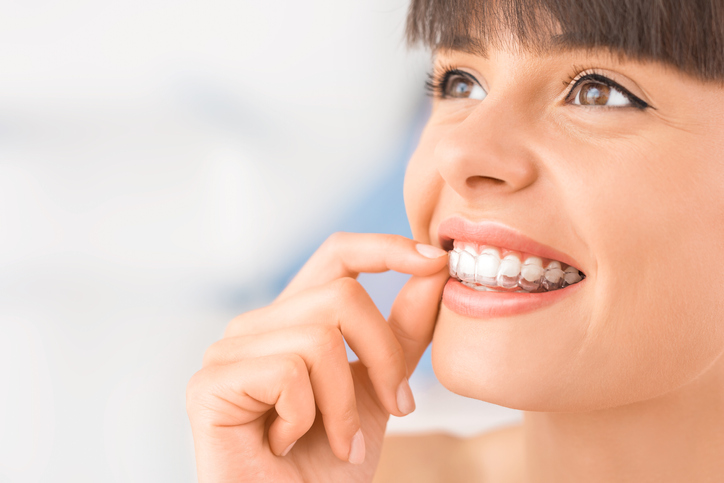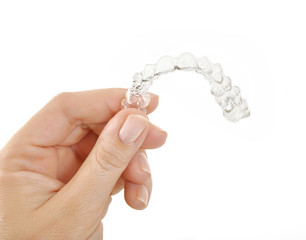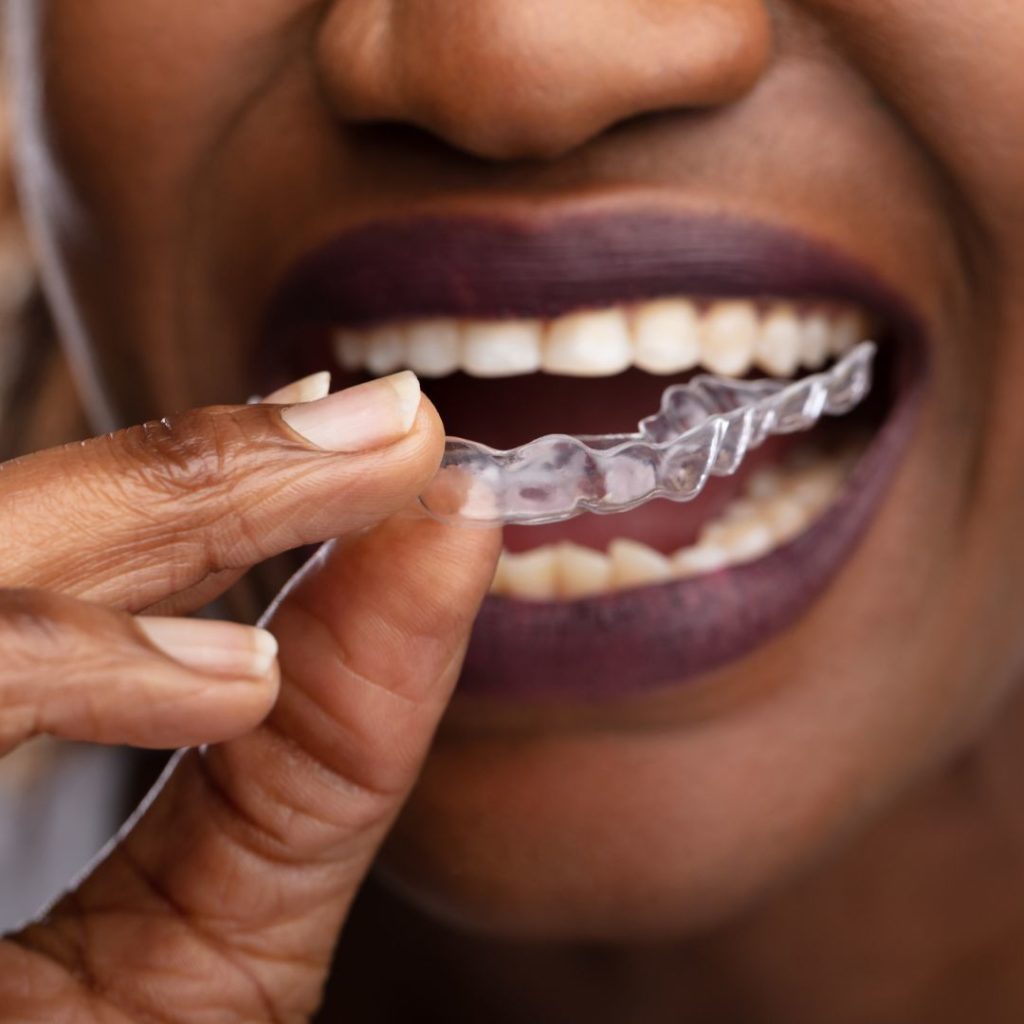Blog
Three Ways to Improve Your Smile Aesthetic

The appearance of your smile isn’t only important to your overall image, it is also integral to your sense of self-confidence. If you’re not fully confident in the appearance of your smile, it can change the way you behave around your friends and co-workers. It may even affect how you feel about yourself. To foster the confidence you deserve to feel, consider how some of the ways your dentist can help you improve the appearance of your smile.
Invisalign
This tooth-straightening treatment picked up steam very quickly once it became available and it hasn’t slowed down since. Dentists have been using Invisalign aligners to straighten smiles for many years now. We know what it can do and what it cannot (for the record, it can do a lot!). Known for its use of clear aligners, the Invisalign system provides a discreet and comfortable way to correct mild to moderate alignment issues. Examples include turned teeth, gaps, overlaps, overbite, cross-bite, and underbite. In addition to being nearly invisible, Invisalign aligners are also appreciated for their usability. At meal-time and at oral-care time, simply remove the aligners and go about your normal habits. Just be sure to insert them right away. It is imperative to wear aligners for 22 hours a day to achieve the expected outcome in the allotted time.
Veneers
Cosmetic dentistry has developed multiple ways to improve individual or multiple teeth. Veneers can transform the smile by disguising imperfections related to size, proportion, color, and position. The treatment process is relatively short and straightforward. After preparing a tooth or teeth for the veneer, the dentist takes impressions. A dental lab uses the impression to manufacture the perfect size, color, and shape of the veneer to achieve its intended outcome. The veneer is then bonded to the front of the tooth, where it can remain stable for several years.
Dental Implants
Restorative dentistry grew by leaps and bounds when dental implants were created. These small devices have significantly improved patient outcomes in the treatment of missing teeth. Dental implants restore the foundation that is needed for a false tooth to feel natural. Bridges and dentures may look natural but, according to many patients, they certainly don’t feel it. They may feel unstable or uncomfortable as they rub against the gums or a used for chewing. Dental implants resolve these issues by integrating into the jawbone, where they are surgically implanted in a painless procedure. The integrated implants can last indefinitely, providing the stability that is needed for confident chewing and speaking.
In our Burke, VA office, we have the opportunity to help patients love their smiles a little more. Invisalign, veneers, and implants are just a few of the services that can help us achieve this goal. If you are interested in boosting your smile aesthetic, contact us at (703)-935-2879 to schedule your consultation.
Posted on March 30th, 2021
What Happens if I Don’t Wear My Retainer?

You’ve gone through the hard part of straightening your teeth and are loving your results. Now that you get to see your best smile, the last thing you may want to do is muck it up with a retainer. Many orthodontic patients, whether they have traditional braces or Invisalign, feel tempted to not wear their retainers. We strongly encourage all of our patients to avoid this temptation. Here, we discuss what happens if you don’t wear your retainer as directed.
What a Retainer Does
To understand the importance of wearing a retainer, you should know what it does for your smile. Retainers are removable orthodontic fixtures that hold your teeth in their new position after you have completed your straightening treatment. These fixtures come in a variety of forms and can last years with good care. Each retainer is custom-made to the exact mold of your mouth and teeth. In that form, the retainer prevents teeth from shifting.
Why Teeth May Move after Orthodontic Treatment
When you wear braces or Invisalign, your teeth may shift dramatically within the first year of treatment. For teeth to reach their appropriate position in the mouth, the gums and ligaments that secure them become “flexible.” So, without the compression of an aligner or arch-wire, the teeth lose some of the stability that is needed. For some time after orthodontic treatment, the periodontal ligament, teeth roots, and gums are more likely to conform to their natural tendencies. Retainers are worn to combat that.
Do I Have to Wear a Retainer Forever?
Understandably, you want your smile to look naturally straight and beautiful. Wearing a retainer can feel constrictive. It can feel like a let-down to have to wear this fixture after being freed from braces or aligners. However, your dentist will probably instruct you to wear your retainers at all times for 6 to 12 months. The good news is that, over time, the tissues that could shift teeth into their old position get used to the new pattern. They stop pulling teeth out of alignment. After 6 to 12 months, as instructed by your dentist, you may reduce your wear to nighttime only. Some people continue to wear their retainers nightly for many years. Some reduce their wear to two to three times a week after two or more years of nightly wear.
Ultimately, the entire point of completing an orthodontic treatment program is to have straighter, more attractive teeth. Wearing a retainer after treatment is part and parcel of the outcome of care. To learn more about Invisalign, contact our Burke, VA office at (703)-935-2879.
Posted on March 15th, 2021
We’re Answering Questions about Dental Implants

Tooth loss is an age-old problem for which we now have modern solutions. It is not something that a person has to live with now that there are viable, long-lasting solutions. Today, patients choose from dental bridges, dentures, and dental implants to restore the smile. Dentists often recommend dental implants to patients, and just as many patients ask about this treatment option. Here, we answer questions that often come up during dental implant consultations.
Why are dental implants preferred today?
Dental implants are surgically set into the jawbone. Over a few months, implant posts become encased in bone and will then act as new roots for replacement teeth. This protocol is preferred primarily because it offers significant benefits as compared to traditional treatments. These include:
- Greater stability and security
- Improved comfort
- Long-lasting
- Full restoration of chewing and speaking
- Will not slip or fall out during wear
What’s involved in dental implant treatment?
Dentists may place dental implants in a few different ways. The course of treatment depends on each patient’s dental needs and personal preferences. In some cases, a single procedure can fully restore a missing tooth. In more complex cases, a patient may require multiple smaller procedures over several months. Customizing the treatment plan to the patient is essential for an optimal outcome that can last a lifetime. Generally, dental implant treatment involves the following:
- Using a local anesthetic, the dentist numbs the treatment area.
- The dentist makes a small incision in the gums to gain access to the jawbone. A small instrument is used to insert the implant. Gum tissue is stitched over the implant so the post can sit undisturbed as it heals.
- A temporary denture or bridge may facilitate chewing. Patients may want to make minor dietary changes to prevent excess force on the implant.
- The implant integrates into the jawbone over a few months.
- Once the implant is embedded into the jawbone, a second procedure is done to attach an abutment to the implant. Gums are stitched around this piece. The abutment ultimately connects the implant to the artificial tooth.
- The final procedure in implant treatment attaches the artificial tooth to the abutment.
How Much Does Dental Implant Treatment Cost?
The cost of dental implant treatment varies depending on several factors. Dental insurance may cover a portion of the treatment but typically does not provide complete coverage. For example, the cost of the artificial tooth or teeth may qualify for insurance assistance but dental implants may not. We encourage patients to contact their insurance provider before seeking treatment. In addition to evaluating the up-front costs of dental implant treatment, patients should consider the long-term costs associated with this treatment versus traditional fixtures like dentures. This kind of cost analysis often points to dental implants as the most cost-effective treatment.
Learn more about dental implants. Call our Burke office at (703)-935-2879 today!
Posted on February 28th, 2021
Bruxism: An Unknown Consequence of Pandemic Shut-Down

A few months ago, the New York Times reported an increase in dental complaints such as tooth sensitivity, jaw pain, and headaches since the novel coronavirus forced a global shutdown. Additionally, dentists report an increase in tooth fractures in the past several months. These concerning problems are often related to tooth grinding and clenching. In turn, bruxism often relates to stress. It is no secret that months of shutdown and the uncertainty of the pandemic itself are the perfect ingredients for a stressful situation.
If you are concerned that you might be clenching and grinding your teeth, talk to your dentist. Bruxism can cause several unpleasant side effects. Lifestyle habits and appropriate dental care may correct them.
What Is Bruxism?
Bruxism describes clenching and grinding. Clenching occurs when you bite down with extreme force for a prolonged period. Grinding involves stronger than normal biting force as well as a back-and-forth motion. A person may do these things without knowing it but may notice the symptoms of these movements. Bruxism may be discovered through symptoms such as jaw soreness, tooth soreness, or sensitivity. With prompt attention, bruxism may be managed before it can cause more severe problems such as:
- Severe headaches
- Jaw, face, or neck pain
- Chronic sleep disruption
- Damage to tooth enamel
- Tooth fracture
Is Bruxism Preventable?
Because bruxism is associated with stress, there may be no way to avoid all potential triggers. However, the person who establishes strong stress- management skills may be less likely to clench or grind their teeth. Additionally, experts advise people to reduce caffeine and alcohol intake and avoid smoking, at least before bed. Relaxation techniques such as breathing exercises, meditation, listening to music, or taking a walk are also helpful.
What if Bruxism Has Already Begun?
Bruxism can cause problems that take time to resolve, so an evaluation should occur as soon as symptoms appear. A dentist may not cure bruxism but can provide services that minimize the impact of excessive biting force. The most common approach to managing bruxism is a nightguard. This appliance is worn at night. It fits over the teeth like a mouth guard that one would wear while playing sports. It does not prevent grinding and clenching, but it prevents damage that could result from extreme pressure.
Stress can negatively impact your dental health. We can help you address problems like bruxism with conservative, non-invasive care. To schedule your consultation, call (703)-935-2879.
Posted on February 14th, 2021
Even in the Time of COVID, Invisalign Makes Sense

Nationwide stay-at-home recommendations were announced several months ago. Since that time, time on social media has increased an astounding 61%. There may be some benefits to this but there are drawbacks, as well. If you spend any time on social media, you are being inundated with advertisements for everything from clothing to beauty treatments and more. One such advertisement that has become popular in recent years and is surging among people using this time to address their smile concerns is mail order teeth-straightening aligners. Here, we discuss why, even during the time of COVID, Invisalign makes more sense than mail-order systems like Smile Direct.
Invisalign Leaves No Room for Error
Teeth-straightening affects more than the look of your smile. When teeth are crooked, overlapping, and misaligned, they do not fit well together. This may place excessive stress on the joints of the jaw. Teeth may not meet up against one another as they should. This increases the risk of gum disease and tooth decay that could result in fractures. Seeing how impactful misalignment is, we realize that there is no room for error when correcting this problem. When you see a dentist for Invisalign, you receive a thorough dental examination, high-resolution imaging, sophisticated treatment planning, and continual oversight through periodic check-ups. The process ensures that you get the results you want.
Invisalign is Approved by the American Dental Association
When considering products and treatments, it is important to look for the ADA seal of approval. This organization was established with the mission of providing people with effective, safe dental care. As an approved teeth-straightening treatment, Invisalign takes the whole mouth into consideration, including individual teeth, roots, the gums, and the joints that operate the jaw.
We understand the desire that people have to straighten their teeth conveniently and comfortably. We understand that mail-order braces can seem like both of those, as well as a low-cost option for getting a better smile. In the end, undergoing treatment with a board-certified dentist is the safest, most cost-effective option there is.
Dr. Price is not only an experienced dentist; he is a Premier Invisalign provider in Northern Virginia. To learn more about this system, schedule a consultation at our Burke office at (703)-935-2879.
Posted on January 30th, 2021
The Hidden Way that COVID-19 May Affect Dental Health
Over the past several months, we have been exposed to the uncertainties of life. The COVID-19 pandemic has affected society in multiple ways, leading us to rethink how we go about our days. While we’ve had to become more alert and mindful about things like handwashing and social distancing, we’ve also had to manage the mental impacts of these new stressors. In our Burke dental office, we have implemented strategies that have enabled us to continue serving our patients. Here, we serve by discussing how stress from the pandemic of 2020 may affect dental health and what you can do about it.
How Stress Impacts the Smile
When we are under stress, several dental conditions and habits may develop, including:
- Nail-biting. This habit is a common subconscious reaction to stress. Biting on nails is like biting on any hard object; it can weaken teeth. Additionally, biting fingernails could introduce new bacteria into the mouth.
- Bruxism. Like nail-biting, bruxism is an unconscious habit that weakens teeth and gums. Bruxism is the clenching and grinding that you may do in your sleep. Because of this, you may not realize you are doing it until you suffer a cracked tooth or other damage.
- TMJ disorder. This condition may result from bruxism, chewing gum, chewing on hard objects, or other factors. The TMJs are the temporomandibular joints at the sides of the jaw. They help you open and close your mouth. Stress on these joints can lead to uncomfortable stiffness, pain, clicking, and other symptoms.
Relieving Stress is Good for Your Smile
As we continue to navigate how we will restore a sense of normalcy in our lives, specific habits can help you manage your healthiest smile in times of stress. Suggestions for making it through a stressful pandemic include:
- Wash your hands several times a day and use hand sanitizer when you go out.
- Get enough sleep. Experts say that we do best with at least 7 ½ hours a night. When stressed, the body may ask for more.
- Engage in calming activities daily. This may include meditation, coloring, gardening, walking outdoors, or listening to favorite music.
- Talk with trusted friends or a therapist. We are living in an unprecedented time. We cannot be expected to know how to manage the stressors we have been facing. Getting help can be one of the best decisions you make for your emotional and physical health.
Our patients’ peace of mind and health are our top priority. To talk with a staff member about our current protocols and to schedule your visit, call (703)-935-2879.
Posted on January 15th, 2021
Your First Month in Invisalign

Getting Invisalign is an exciting step toward a healthier, more attractive smile. You may be ready to begin your journey but feel somewhat uncertain about what it will be like to go through the teeth-straightening process. It is common to feel this way whether Invisalign is the first-line treatment or is a follow-up to traditional orthodontic care. Most people who look into Invisalign know that this treatment comes without the burden of obvious brackets and wires, and that aligners can be removed so meals can be enjoyed as usual. Still, Invisalign is all about moving teeth. Here, we discuss the initial stage in which patients get used to their new treatment system.
Inserting and Removing Aligners
Invisalign aligners are made using sophisticated software that builds a treatment plan based on high-quality images of your teeth. The point is not for aligners to fit well; the point is for them to move your teeth. Because each aligner is slightly “off” your regular, misaligned bite, it may feel challenging to insert and remove aligners at first. The longer a set of aligners is worn, the easier each gets to insert and remove. This indicates that your teeth are moving. Every time you move to a new set of aligners, you’ll notice new difficulty inserting and removing.
Soreness
Invisalign is like traditional braces in one way, the aligners move teeth to create a better smile. As the changes are happening, you will feel them. For the first few days of each set of new aligners, expect mild to moderate soreness. Most patients find that this lasts no more than a week. Although soreness can feel uncomfortable, it is an indication that good things are to come; namely a healthier, straighter smile! If soreness is distracting, take an over-the-counter pain reliever like acetaminophen as needed until comfort improves.
Constant Wear
Regardless of soreness, it is necessary to wear Invisalign aligners most of the time. They may be removed to brush and floss and to eat. However, aligners should not be left out for too long. This can slow the progress of movement and, if it occurs often enough, can increase the time it takes to reach the estimated outcome. Just remember, the more consistent you are with wearing your aligners, the sooner you’ll get over those little bumps in the road, like soreness and tightness.
Dr. Price is a Premier Invisalign Provider serving Northern Virginia from our friendly office in Burke. To schedule your Invisalign consultation, call (703)-935-2879.
Posted on December 30th, 2020
The Causes of Bad Breath

Bad breath strikes us all from time to time. It’s sometimes unavoidable, especially if we enjoy eating especially pungent foods. You may notice an odor on your breath after that garlic-laden meal or a salad with a healthy portion of onions. These are the minor frustrations that can be handled by drinking extra water, chewing some mint gum, or brushing teeth after consuming notoriously smelly foods. What if bad breath isn’t related to foods, though? And what if it persists day after day or gets worse over time? This is a problem that can be handled between you and your dentist.
When bad breath is not caused by food, it is important to schedule a dental exam and cleaning. The odor could be a sign of a few different problems that your dentist can treat. Some of the common causes of bad breath include:
- Plaque and tartar buildup. If you brush only once a day and do not floss your teeth, you have a higher risk of plaque and tartar buildup. Plaque is an invisible film that harbors not only debris but also bacteria. Bacteria deposit waste onto teeth and gums that can become foul-smelling. Your dentist can perform a thorough cleaning that removes plaque and tartar and gives you a fresh slate to improved oral health – and better breath!
- A dirty tongue. Just like debris can accumulate on the teeth and gums, it also often builds up on the back of the tongue. Sulfurous waste from bacteria travels on the breath. The tongue can be brushed with the toothbrush. However, a tongue scraper is a better idea. This can be purchased at a pharmacy and should be used gently so as not to irritate delicate tissue.
- Gum infection. Whether it is a mild form of gingivitis or full-blown periodontal disease, infection carries bacteria. Gum disease in all of its forms is a common cause of bad breath. Professional treatment can eradicate the infection and restore integrity to the gums. Treatment should be followed with good oral health practices that include brushing twice a day and flossing every day.
- Dehydration and fasting. If you are dehydrated or regularly skip meals, your mouth will produce less saliva. Saliva carries odorous bacteria from the mouth and can be stimulated by chewing gum and sipping water throughout the day.
We can help you get a handle on bad breath. Call (703)-935-2879 to schedule your visit with Burke, VA dentist Dr. Stephen Price.
Posted on December 15th, 2020
A Toothache is a Sign You Need a Full Dental Checkup

Toothaches are uncomfortable, to say the least. Most people do what they can to avoid this stressful problem. Even if a toothache is mild, it is a signal that something is affecting those pearly whites. Sometimes, tooth pain can be a secondary problem. For example, a sinus infection or bad allergies may cause nerve irritation that results in pain in the mouth. This can happen but, more often than not, a toothache means you need a dental checkup.
What Causes a Toothache?
The most common reason a person gets a toothache is that a tooth has begun to sustain damage from oral bacteria. Another reason a tooth may hurt is that it has been fractured or because grinding or clenching takes place during sleep. A toothache can feel like a dull ache or sharp or throbbing pain. It may occur intermittently or remain constant. The tooth may hurt only when chewing or brushing teeth, or when drinking hot or cold beverages. However, tooth pain feels, it is important to get to the source of that pain. A full dental exam can do that.
When Should I See a Dentist for My Toothache?
People often treat tooth pain with warm salt-water rinses or over-the-counter pain medication. Because toothaches usually stem from an underlying problem like decay, home remedies only provide temporary relief. They do not resolve the problem that is causing pain. Without adequate care, the toothache is likely to persist or come back even worse. See a dentist if:
- Tooth pain lasts more than a day or two.
- Pain is severe.
- Tooth pain coincides with swelling, fever, or jaw pain.
What to Expect at Your Dental Appointment
When you have a toothache, your dentist will try to fit you into their schedule right away. When you call our office, let us know the reason for your visit. We don’t want you waiting any longer than absolutely necessary to get the care you need to restore comfort. At the time of your visit, we may perform full x-rays or x-rays only of the area where the pain is occurring. This depends on how long it has been since your last full dental exam. Dr. Price may ask for details about your toothache, such as the type of pain you are having. He will review the x-rays to evaluate the root of your tooth and the tooth structure itself for signs of damage such as a fracture. Treatment can then be performed based on the reason for the toothache.
A toothache may be treated with a filling, inlay, onlay, or crown. In more severe cases of damage, a root canal may be needed. It is advantageous to schedule a dental exam as soon as a toothache starts so we can repair the problem in the most conservative way.
Schedule your dental exam at our Burke, VA office today. Call (703)-935-2879.
Posted on November 30th, 2020
Reasons to be Thankful for a Straight Smile

Uneven, crooked teeth. It’s not that bad, right? Actually, it can be. We often talk about the value of a straight smile as it relates to cosmetics. It’s no secret that a straight smile can make a person more confident than if they had crooked, overlapping teeth. Studies also point to the social and professional rewards of having an attractive smile. But is that the only thing we’re concerned with when we talk about reasons to seek teeth-straightening? Not at all! Here, we point out a few other reasons to want your teeth to be aligned.
Straight teeth are:
- Easier to care for. When teeth are turned or overlapping, it can be frustrating trying to reach those nooks and crannies. Even a trained hygienist has to take extra steps to get into these places and flush out debris and bacteria. When teeth are aligned as they should be, brushing and flossing get that much easier. They also gain greater effectiveness.
- Better for the gums. The gums and the teeth go together. When teeth are not aligned, the gums can be affected in two ways. First, debris that collects in hard-to-reach places causes inflammation in the superficial gum tissue. This inflammation can cause the gums to weaken and pull away from teeth, leading to full-blown infection. Another way that misaligned teeth can affect the gums is to place too much stress on them when biting down. The excess stress also contributes to gum recession and infection.
- Happier teeth. Teeth that are aligned work together more efficiently to disperse the force of biting and chewing. Crooked teeth don’t fit as they should against opposing teeth, which can cause unnecessary and excessive friction. This can wear teeth down more quickly than would occur if teeth were aligned.
We Make it Easy to Get a Straight Smile
Dr. Price is a Premier Invisalign provide in Northern Virginia. In our Burke office, we have helped many people get the straight smile they have wanted. With that straight smile comes improved confidence and better oral health. To learn more about Invisalign, schedule your consultation with us at (703)-935-2879.
Posted on November 15th, 2020


